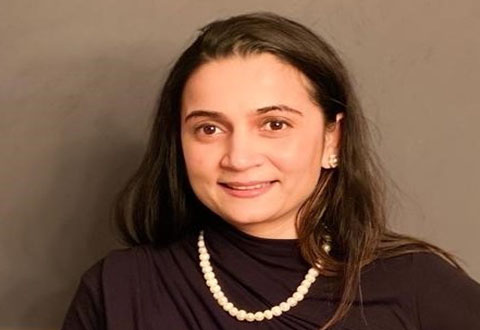VA Mid-Atlantic Health Care Network
New measure helps reduce alcohol use disorder

Photo of Dr. Tanvi Patil, Salem VA HCS Associate Chief of Pharmacy for Clinical Services and Education
Metrics and measurements often show companies how effective things are, but in the Fall of 2021 when Dr. Tanvi Patil looked at the numbers, she saw an opportunity to make things better for Veterans who receive care through the Salem VA Health Care System.
Patil, who is the Associate Chief of Pharmacy for Clinical Services and Education, noted that the HCS had an opportunity to improve the measures associated with alcohol use disorder. The metrics showed the Salem VA HCS was below national and regional thresholds, and she identified it as an area for improvement.
“We were doing a great job screening our Veterans who might have alcohol abuse issues, but we weren’t doing as well in getting them the necessary help,” Patil said. “The metric was specifically associated with our ability to provide what we call a Brief Intervention, or a BI.”
Patil said that once a Veteran is identified as being positive on the alcohol use disorder test, a Brief Intervention should be issued. “We used the national population dashboards to identify Veterans who might be impacted by this but who might not be getting the help they needed,” she said. “Using the resources we had – a clinical pharmacy specialist, trainee resources etc., we designed a project where we sent out educational literature to Veterans and then started calling them.”
The cold calling allowed the team to reassess a Veteran’s alcohol use and offer them additional help if necessary.
“We found some Veterans had already started cutting back on their own,” Patil said. “For the most part, however, many were still showing positive indications and we offered them additional help.”
By collaborating with social work and psychologists from the primary care mental health integration clinic, the team started a new practice led by pharmacists.
“Now we have a channel for referring patients who want to speak with a psychologist or pharmacist and be referred for additional care to help them reduce or quit their alcohol intake.”
The risk to Veterans - specifically for alcohol issues because of mental health co-morbidity issues such as PTSD, depression, and anxiety - are more prevalent in Veteran patients than in the general population. These issues put Veterans at a higher risk of alcohol use disorder. Patients are responding to the offer of assistance.
“This is a very sensitive topic and there is a lot of stigma associated with it,” Patil said. “For the most part, patients have been very receptive.” Patil’s team reached out to about 150 Veterans and were able to speak to nearly 100 of them, offering referrals to the Primary Care Mental Health Integration Clinic (PCMHI) clinic where they were able to speak with a psychologist. Several have started pharmacological therapy.
“When we look at the efforts that go into this outreach, you see it takes a lot more effort to convince patients to accept help. A lot of this is the perception of, ‘I don’t have a problem’ or perhaps there is a stigma associated with it. A lot of patients don’t want to be referred to ‘mental health’ per se; so, we work through that as we talk to the Veterans, and bring an awareness of how this is impacting their health. That alone has had a big impact, even if they didn’t accept referrals to starting pharmacological therapy or medication or seeing a psychologist in the first place. But this increases awareness and gets them to start thinking in that direction.”
Since beginning the program in late 2021 more than 150 patients have responded to the team’s calls and accepted the offer of assistance. Patil said she believes the team’s inclusion of a full-time pharmacist dedicated to the PCMHI Clinic has been a major step forward in improving access.
“Because psychologists cannot prescribe medication, having a prescribing provider will open up avenues for Veterans in terms of access to pharmacological therapy. It also helps us narrow a pool of patients who are not in compliance with certain measures and increases our ability to find these patients and call them to make interventions,” Patil said.
Patil said the PC-MHI Pharmacist has, since her hiring, obtained a DEA license which will further expand access to help veterans with opioid use disorders and substance use disorders in the future.
















